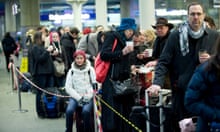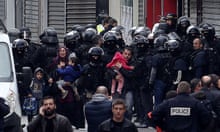Barack Obama has hit back at Republicans who want to stop the US taking in Syrian refugees – with the president saying some of the language used in the wake of the Paris attacks only serves to strengthen the Islamic State terror group.
Obama rounded on Republicans in Congress who are preparing legislation that threatens to suspend a US refugee program for Syrians – and on state governors who have said threatened to try to block the refugees’ entry. The Obama administration has revealed details of its screening system to reassure sceptical lawmakers worried about terrorist infiltration.
The House speaker, Paul Ryan, escalated the political row that has been growing since the Paris attacks by announcing on Tuesday that he had formed a taskforce to examine ways of forcing Barack Obama’s hand on the issue.
Obama, speaking in the Philippines where is attending a regional summit, said: “We are not well served when, in response to a terrorist attack, we descend into fear and panic. We don’t make good decisions if it’s based on hysteria or an exaggeration of risks.
“When individuals say we should have a religious test and that only Christians, proven Christians should be admitted, that’s offensive.
“I cannot think of a more potent recruitment tool for Isil [Isis] than some of the rhetoric that’s been coming out of here during the course of this debate.
“Isil seeks to exploit the idea that there’s war between Islam and the west, and when you see individuals in positions of responsibility suggesting Christians are more worthy of protection than Muslims are in a war-torn land, that feeds the Isil narrative. It’s counter-productive. And it needs to stop.
“And I would add, these are the same folks who suggested they’re so tough that just ‘talk to Putin’ or staring down Isil [will work] … but they are scared of widows and orphans coming into the United States of America as part of our tradition of compassion. At first they were too scared of the press being too tough on them in the debates. Now they are scared of three-year-old orphans. That doesn’t seem so tough to me.”
Earlier, Paul Ryan told reporters on Capitol Hill: “Our nation has always been welcoming but we cannot let terrorists take advantage of our compassion.
“This is a moment where it is better to be safe than to be sorry, so we think the prudent, the responsible thing is to take a pause in this particular aspect of this refugee program in order to verify that terrorists are not looking to infiltrate the refugee program.”
Fifteen state governors, including one Democrat, have said they will not accept refugees from Syria but under federal law they have little power to block their entry into the country or interfere with federal resettlement programs, many of which are administered by charities.
Ryan is under growing pressure, particularly from Republican presidential candidates, to take the battle to the White House by passing legislation that could potentially become attached to essential spending bills.
“The American refugee laws are important. It’s important that we have a refugee system in place,” said the House speaker. “We respect that, but we think it’s simply prudent that for this particular program in this particular situation that we be better guarded against any possible infiltration.
“We’ve assembled a taskforce starting Saturday to consider legislation as quickly as possible,” he added. “We’re meeting every day and we will bring legislation forward.”
Though the White House rejects the argument put forward by Republicans, officials are worried by what they claim are false rumours about the resettlement programmes and have organised a series of calls with governors to try to reassure them.
“There is a lot of misinformation out there,” said one senior administration official during a background briefing for reporters on Tuesday, pointing to wilder claims that the United Nations gets to pick who comes into the country.
Nonetheless, the administration was quick to reassert its executive authority on the matter, dismissing some of the existing threats by Republicans.
“While states and local authorities have an important consultative role, this program is administered by the federal government,” said one official.
“The US can be home to many more refugees than we currently bring in,” added another. “We can do better.”
Ohio governor and Republican presidential candidate John Kasich agreed, saying that state governments “don’t have the authority” to block the resettlement of refugees but can “only express their concerns”.
Kasich’s comments come a day after the Ohio governor asked the Obama administration to stop resettling refugees in his state.
He explained by describing a conversation he had with his daughter Reese. “Reesy, you know, we understand these people are in trouble,” Kasich said. “But think about us putting somebody in our street, in our town, in our country who mean us harm. We can’t do that, can we, Reesy?” Kasich amplified this by noting: “I get criticized for having a big heart. I have a big heart, but I have a big brain, too.”
The screening process begins with the UN in refugee camps and includes extensive interviews by US officials and biometric checks. At current rates, almost half of applicants are successful.
The United States has resettled 2,200 Syrian refugees to date, according to the State Department, which organised a conference call on Tuesday with executives who run charities that work on placing refugees from Syria and elsewhere.
“We always try to take refugees who are at real risk in their countries, who are most vulnerable to abuse or trafficking,” said Lavinia Limón, head of the US committee for refugees and immigrants.
She described an arduous process of security checks refugees must submit to, although the precise details of screenings are confidential. After being referred by the UN, each refugee case is screened by multiple US intelligence agencies. Then an officer with the Department of Homeland Security interviews the applicant.
If a refugee is approved, periodic screening continues, in a process that takes on average about two years, from recommendation to acceptance. Special attention is given to men aged 18 to 65.
“We have seen many cases just be canceled,” Limón said. “We are never told why.”
Less than one-tenth of 1% of refugees in need worldwide get the opportunity to resettle anywhere, she said.
The Syrian conflict has displaced an estimated 11.6 million people in less than five years.
In September, Obama directed his administration to prepare to accept 10,000 new refugees from Syria in the next fiscal year. The United States accepts about 70,000 refugees for resettlement each year.
About 15,200 Syrian refugees currently await processing by the United States for resettlement, according to State Department figures.








Comments (…)
Sign in or create your Guardian account to join the discussion